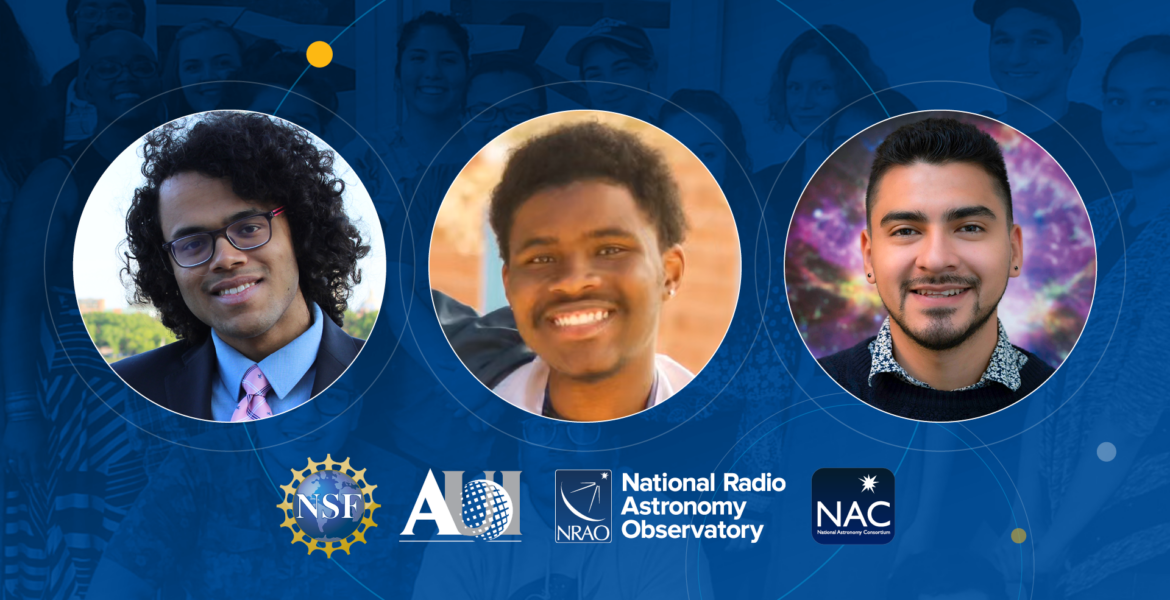Astronomers using the Atacama Large Millimeter/submillimeter Array (ALMA) and NASA’s James Webb Space Telescope (JWST) have discovered that some of the most massive stars in our galaxy are emitting unbelievably tiny grains of carbon dust—dust that one day could form future stars and planets.
Recent News
ALMA Creates Largest-Ever Image of the Milky Way’s Core
The new survey—known as the ALMA CMZ Exploration Survey (ACES)—maps more than 650 light-years across the Central Molecular Zone, the extreme environment that surrounds our galaxy’s supermassive black hole.
Mission Patagonia Welcomes Its 2026 Nature Guardians
A small cohort of educators, scientists and environmental leaders will embark March 3-14 to the southern edge of the world for Mission Patagonia, an immersive outdoor environmental education experience designed to foster deep connection to place, people and planet.
AUI and the NRAO Announce the Recipients of the 2023 AUI Board of Trustees NAC Bridge Scholarship Award

Credit: Jeff Hellerman
AUI and the National Radio Astronomy Observatory (NRAO) have announced the recipients of the 2023 AUI Board of Trustees NAC Bridge Scholarship Award. Now in its third year, the scholarship recognizes the academic accomplishments of National Astronomy Consortium (NAC) alums and assists them in the transition from undergraduate to graduate programs.
Amidst the excitement of beginning graduate school and the financial considerations of tuition, there can be additional financial burdens related to moving to a new location and establishing a new residence. The AUI Board of Trustees established the new NAC scholarship award in 2021 to help NAC alums manage these expenses during the transition to the next phase of their academic careers.
This year, three NAC alums have accepted offers from outstanding graduate programs around the country. Each will receive a $5,000 AUI Board of Trustees NAC Bridge Scholarship Award, with AUI and NRAO’s congratulations and best wishes for a smooth start to an exciting new chapter of their lives.
2023 Recipients of the NAC Bridge Scholarship Award
- Mohan Richter-Addo, University of Wisconsin-Madison, Astronomy
- Malik Bossett, University of California, Santa Cruz, Astronomy and Astrophysics
- Miguel Montalvo, Princeton University, Astrophysical Sciences
NAC is a competitive program offering summer astronomy research internships to undergraduates and professional development programming and research opportunities throughout the academic careers of NAC alumni.
“This scholarship will help me acclimate to living on my own in a new city, and it will pay for various initial costs of moving, such as new cooking and cleaning supplies,” said Mohan Richter-Addo.
NAC’s goal is to increase the number of students, often underserved by the traditional academic pipeline, in STEM and STEM careers, by creating a diverse network of support for their academic and professional careers from an early stage. Miguel Montalvo said that the Bridge scholarship will make a significant difference to the next stage of his education. “This invaluable support will not only alleviate the financial burden of relocation expenses and unforeseen costs but will also enable me to embark on a transformative journey as I pursue my Ph.D, ” Miguel Montalvo said.
A key component of the NAC program has been the long-term sustained engagement of alums and, perhaps most importantly, the peer and near-peer support that NAC alums offer to each other. As Malik Bossett said, “NAC has helped me connect with other undergraduate and graduate researchers of color, along with allowing me to participate in and present at NACtober in 2020.”
NRAO and AUI appreciate the commitment that NAC alums have to each other and to their own professional journeys, and are proud of their individual and collective accomplishments.
About NAC
National Astronomy Consortium (NAC) is a program of the National Radio Astronomy Observatory, a facility of the National Science Foundation, operated under cooperative agreement by Associated Universities, Inc. NAC is a summer research experience program for undergraduate students in the United States who have been under-served by the traditional academic pipeline. The program aims to increase the number of students in STEM fields by helping them to build networks of support for success early in their academic careers and beyond.
This news article was originally published on NRAO website on July 5, 2023.
Recent News
A Quintillion-to-One: Giant Stars, Tiny Dust
Astronomers using the Atacama Large Millimeter/submillimeter Array (ALMA) and NASA’s James Webb Space Telescope (JWST) have discovered that some of the most massive stars in our galaxy are emitting unbelievably tiny grains of carbon dust—dust that one day could form future stars and planets.
ALMA Creates Largest-Ever Image of the Milky Way’s Core
The new survey—known as the ALMA CMZ Exploration Survey (ACES)—maps more than 650 light-years across the Central Molecular Zone, the extreme environment that surrounds our galaxy’s supermassive black hole.
Mission Patagonia Welcomes Its 2026 Nature Guardians
A small cohort of educators, scientists and environmental leaders will embark March 3-14 to the southern edge of the world for Mission Patagonia, an immersive outdoor environmental education experience designed to foster deep connection to place, people and planet.
